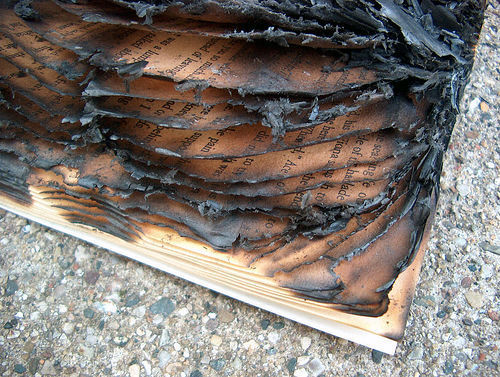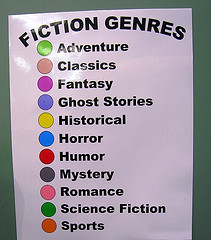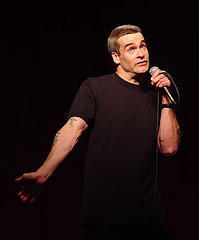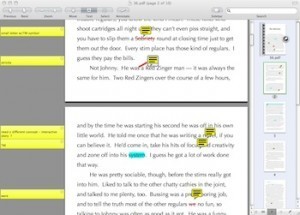M. Darusha Wehm's Blog, page 16
October 10, 2012
Bad Books

photo credit: jamelah via photopin
…by which I don’t mean poorly plotted or badly written books. I mean books containing subject matter which we find uncomfortable or disturbing.
Last week was “Banned Books Week,” and while I don’t really hold a lot of truck with thing-of-the-week weeks, there was a lot of talk on the internet about books that had been banned, so I’ve been thinking about it.
Like most writers, I’d argue that banning books is dumb if your goal is to get people to not read those books, especially if the people you’re targeting are kids or teens. I mean, what’s more appealing than a book the stodgy old farts think is BAD?
As Mark Twain said when the Concord Library banned The Adventures of Huckleberry Finn: “Apparently, the Concord library has condemned Huck as ‘trash and only suitable for the slums.’ This will sell us another twenty-five thousand copies for sure!” (via this Flavorwire post of quotations from writers of banned books)
But why does a book get banned in the first place? It’s because there’s something in it that makes people feel uncomfortable, that makes them squirm. Something taboo.
Over at Write Anything, there have been a few conversations about whether or not there should be any topic that’s off-limits for a writer. Part one, part two and part three. They’re worth a read, but long story short, I argue no and other commenters point out that there are different ways of handling topics. Some say that if you want to write about touchy subjects you have to approach them with the “right” sensibilities.
I agree in some ways. If you want to write well about taboo subjects, then yes it’s important to really think carefully about the issues surrounding those subjects. But I’d still argue that we have the right to write however we want about whatever we want. We just can’t expect anyone else to like it.
It’s certainly true that people could (and most certainly have) written books that are racist, rude, hateful and vile. But to my mind, that’s a different kind of bad book – one that I don’t want to read, not one that I shouldn’t be allowed to read (or, for that matter, write).
October 3, 2012
Write Better: Link Roundup

photo credit: Mr. Wright via photopin cc
Two very different items to help us write mo’ better prose today:
Via Ripley Patton on Google+, Pro Writing Aid. It offers a free web service to scan chunks of prose for editing infractions. I was skeptical, but it caught some items for legitimate concern in the test piece I gave it. And it had me at homonyms – all that analysis does is scan for known homonyms, but by calling them out in red, you can easily see if you’ve got they’re or their in there.
I haven’t investigated their fancy dictionaries or the community on the site, but the editing tool looks like a great addition to the arsenal. Note the word arsenal. As I commented to Ripley, just as the prudent mariner does not rely on one navigation source alone, neither does the prudent writer rely on one editor (human or machine). #sailortalk
Now if I could just find a program that scans for typos that turn into real words. I can’t seem to stop typing form when I mean from. Seriously. It’s annoying.
In other news, this is form from back in April, but Colin Nissan’s The Ultimate Guide to Writing Better Than You Normally Do is among the most brutally accurate lists of writing advice I’ve read. The items themselves are the usual suspects, but the details. Ah, the details.
Enjoy!
September 26, 2012
Where Has All the Science Gone?

Image Courtesy NASA/JPL-Caltech
Among the people I follow online, there’s a lot of F* Yeah, SCIENCE! talk. From the way my internet looked a few weeks back, nothing happened in the universe except a rover landing on Mars. Folks I know talk about space, genetics, geology etc. like some people talk about fashion designers or movie stars.
But, the flip side to this is that there’s also a lot of talk about science and rationality being dismissed in the culture at large. SF author Peter Watts made a somewhat inflammatory post about this over on his blog, but it’s a topic that raises its head all the time in my circles.
I’ll come back to this.
On a seemingly unrelated note, writer/editor Ian Sales recently went on a tear about the Hugo awards (the annual fan-voted SF/F awards). While I agree with him on some of the category issues, the main thrust of his argument seems to be twofold: a) there aren’t enough “real” (ie. hard) SF stories on the ballot and b) it’s all a popularity contest.
Both of these points are, I’d say, answered by the very nature of the beast – the Hugos are voted on by the readers. So they are designed to reflect what’s popular*. And what’s popular isn’t hard SF.
Why? Could it be part of that divide between the pro-science crowd and the anti-intellectuals? I’m not sure I believe there is such a pronounced divide, though I have to admit that as a fan and author of hard SF it is disheartening to see how completely fantasy and soft SF have taken over the field. Sure, there are still hard SF stories out there, but overall it’s not what’s selling.
So what is it about science that gets some people so excited, but turns everyone else off? How come people seem to be more interested in reading about magic than technology?
* Interestingly, many of the Hugo winners this year were also Nebula winners. I guess hard SF isn’t that popular with SF writers either.
September 19, 2012
‘A Night to Remember,’ part four
I am pleased as punch to present part of Simon Petrie‘s live-written serial “A Night to Remember,” featuring reluctant hotel detective Gordon Mamon. The first part of this story was posted on Monday on Simon’s site – go read it, then follow the links to get back here. Part five will be posted tomorrow elsewhere – I’ll have the link for you as soon as I get it. A list of all parts is available here.
If you like this story, you should get a hold of Simon’s collection of short stories Rare Unsigned Copy.
This free-fiction folderol has been furnished by SpecFicNZ Blogging Week 2012.
A Night to Remember: Part Four (by Simon Petrie)
‘A Night to Remember’ is a seven-part story, written for SpecFicNZ Blogging Week 2012.
Part One of this story can be found here. Part Two is here. Part Three is here. A full listing of links to the story’s instalments, updated daily, is here.
Gordon stared at the remains of Claudia Iyzowt’s doorway. He wasn’t sure what kind of damage would be inflicted on a plastimahogany door by a rampaging villain in a suit of armour, but he was fairly certain he was looking at it. And of the heiress to the Iyzowt fortune herself, there was no sign.
She’d been in the room, though. The cooling mug of the vending machine’s atrocious coffee blend stood undisturbed on an occasional table near the room’s viewing window.
He pulled out his handheld, switched it to ‘Forensic’ mode, and waved it around the room in an attempt to find clues, DNA, fingerprints. The handheld took a minute to announce the detection of traces of five humans: Gordon Mamon himself, Iyzowt, and three long-time members of Skyward’s cleaning detail. Which, regrettably, made a certain kind of sense: suits of armour didn’t have fingerprints. Nor did waxworks. But the assailant’s DNA should still have left traces, assuming there was any kind of struggle …
No extraneous blood, nor skin cells. Not even a length of hair.
A sudden sway in the freight tower’s motion momentarily unnerved Gordon, and he turned to check the doorway behind him: nothing. Probably just turbulence: they weren’t yet clear of Earth’s atmosphere, and the space elevator’s braided filament was not immune to a little atmospheric push-and-shove. But the scene of the crime was never a good place to loiter.
Where was, though? The freight tower was a twenty-storey structure, with multiple access routes—escaladders, rampways, an old-fashioned staircase—connecting the floors. If he picked a good hiding point, he could stay undetected for a good long time … but it would be three days before the tower module completed its ascent to Skytop, and twenty storeys or not, he doubted his ability to stay concealed for that length of time.
Plus, regardless of the death threats he’d received, there was the small matter of Claudia Iyzowt herself. As the staff member on duty for the next three days, he plainly had a duty-of-care towards her. It wouldn’t do to cower meekly in some hidey-hole, while she was in the hands of … who?
He took the escaladder down two flights, and let himself into a dimly-lit storage room with three connecting doorways and a somewhat disconcerting conclave of waxwork pirates in sundry menacing poses. After sweeping the room, and those adjoining, for signs of life and detecting only himself, he applied his mind to the tasks at hand, which were, as he saw it: (1) to not get killed, (2) to locate and rescue Claudia Iyzowt in some manner commensurate with task (1), and (3) to apprehend or otherwise immobilise whoever might be the occupant of the mysterious suit of armour, provided that this could be effected without breach of criterion (1) and, if possible also, (2). Viewed in this way, the problem constituted a puzzle, and Gordon liked puzzles. (Though he generally far preferred them when they didn’t involve all this pain-of-death-or-serious-injury stuff.)
So: how to approach it?
The voice messages he’d received, those foreshadowing his appointment with certain death—quite aside from however paradoxically, unfairly vague was the concept of ‘certain death’ itself—had sounded not merely sinister, but angry. Which took a lot of doing, considering that the recorded death threats had featured a mechanical voice, impersonal and remote. Anger obviously made it personal, very personal. Gordon wondered who might hate him with sufficient intensity to not only wish him dead, but to go to substantial lengths to give effect to said wish.
Try as he might, and discounting for the moment certain ugly incidents involving lost luggage, Gordon could only imagine one class of people who might hold such an aspiration. Murderers. And in particular, one small subset of the set of murderers.
He turned his mind to reviewing—in a totally non-spoilerish fashion—the outcomes of his previous cases.
Formey’s killer was clearly out of the equation. Kurtz’s attacker was, so far as Gordon knew, out of the system, safe in Alpha Centauri’s maximum-security facility, Alphatraz. And Havmurthy’s assailant, Gordon was sure, was still being questioned by the Saturnian police force. It might, in principle, be possible that an accomplice could be acting on behalf of one of these, but Gordon’s gut said otherwise …
Well, it fitted. The apparent modus operandi, the professional’s keen desire to stay in the game, the ruthless drive to settle any scores. Because when the other killers were eliminated from consideration, it left just the hit-man.
“Haier,” Gordon murmured to himself.
“Correct,” said a voice that was unrecognisable as Gunther Haier’s, from the suit of armour now advancing slowly through the room’s doorway. “Though there’s been a name change, along with everything else.”
Gordon retreated through the thicket of life-size pirate figures, backing towards one of the room’s connecting doors. Trying to remember whether the door opened inwards, or outwards. “Is that so?” he asked. “Why?”
The connecting door opened outwards. Good. Gordon pushed through, and started running.
Behind him, Haier—the suit of armour—was lumbering in pursuit. “Business reasons. Marketing. Image, if you will.”
“Didn’t think you hit-men cared about image,” Gordon called back, reaching the hallway and trying to choose between the rampway and the escaladder. Escaladder, he decided quickly. Upwards. Gordon wasn’t good with heights, and the escaladder was all about heights, but Gordon was even less good with impending violent death. And if Gunther Haier in a suit of armour wasn’t all about impending violent death, then Gordon wasn’t as shrewd a judge of homicidal character as he fancied himself to be.
“To a hit-man, image is everything,” Haier proclaimed. “Hence the armour, and all the other augments. So you can call me—”
At the foot of the escaladder, Gordon turned, transfixed by curiosity despite himself. “Call you what?”
“My new name,” Haier bellowed, with evident pride and not a little menace, “is Sir Tin Death.”
Part five will be posted on Beaulah Pragg’s site.
September 16, 2012
Podiobooks.com – Back In Business
Good news everyone! Podiobooks.com, after a brief hiatus due to some urgent site cleanup, is back online with a snazzy new look.
You can still get quality free audio fiction, serialized into podcast-ready feeds. Check out the featured titles in your favourite genres, and if you’re looking for a recommendation, Nathan Lowell’s Trader Tales series is one of my favourites.
September 12, 2012
The Craft of Writing

photo credit: Olivander via photo pin
Grammar counts. Spelling counts. Constructing a well thought-out paragraph complete with coherent sentences counts.
You’d be surprised how many people argue about those points.
In this final instalment of a series about the three aspects of being a fiction creator, I’m going to talk about writing. The craft of writing well.
Oddly, this is the part of the equation which causes many writers and readers to argue. There’s certainly an idea out there that the quality of the story is the most important part. Grammar, formatting, cover art — all those things don’t matter if the story is good enough.
Part of me wants to agree. After all, most people read fiction for enjoyment, for escape. Hardly anyone would read an utterly dull book with perfect grammar, but there are many people who are content to enjoy a rollicking great tale with less than stellar spelling and punctuation.
This is, of course, because of these three different aspects to fiction. Some readers really do only care about the story. And, of course, if you’re a great storyteller, you can always hire or barter for other people to take care of the details. But if I’m serious about creating fiction, then the craft of the medium is an important part of the work. If I were telling stories through film, I ought to have a good working knowledge of the nuts and bolts of filmmaking. If I’m telling the story in written words, I should work on the craft of writing. Just as if I’m seriously trying to get other people to read my work, I have to tend the authorship part of the process.
In many ways, this aspect of the work is the easiest, since it is entirely a skill which can be learned. There are numerous writing courses, books on craft, technical manuals on grammar and punctuation, which can all help people improve their skills in this area. Also, there are technological tools available which help with some parts of this process.
My point with this series is to highlight the many aspects of the serious print fiction creator. It’s not enough to be a perfect grammarian, just as it’s not enough to tell a great tale. To be on top of one’s game all these aspects need to be involved: authorship, storytelling and writing skill.
September 5, 2012
A Post-Genre Future or Read Any Good Books Lately?

photo credit: Enokson via photo pin
Chuck “Hilarious Potty-Mouth” Wendig has a good piece up about the shifting value of genre labels in fiction. He’s not the first person I’ve seen with this idea; Charles Stross talked about this back in May.
I’m particularly taken with Wendig’s notion of More Granularity:
Think of fiction as having aspects or elements (and those of you who game in the RPG sense will see the value of this) — a piece of fiction might have a “time travel” aspect, a “tragedy” aspect, a “detective” aspect. One novel might be “serial killer / robot / erotic love triangle.” Another might be, “dinosaur / noir / bioethics.”
It seems clear to me that in other than the most basic of genre plots this is already what’s going on in genre fiction. Really great mystery stories are about a lot more than just figuring out whodunnit – they’re also romances, war stories, alternate histories, literary fiction, buddy stories… the list goes on.
The point of genre has historically been, both Wendig and Stross argue, to help readers find things they’ll like. Judging a story based on its genre is something I think most of us do, usually to our detriment as readers. There ought to be a better way — and there is: recommendations.
Some of the best books I’ve ever read were recommendations from friends. I was an SF anti-fan for years, until I was handed a copy of The Player of Games by Iain M. Banks. It’s Space Opera, but so much more. It was the more that enchanted me — and it’s that more that’s the common aspect to all the books I’ve ever loved, regardless of the label on the shelf where they’ve been placed in the bookstore.
I still get recommendations, both directly from folks I know and also indirectly from my connections on Goodreads. But there is certainly a way to harness technology and networking to make a more robust recommendation system. Wendig has an idea, referring to the story aspects discussed earlier:
Think … of a Pandora-like app that searches your e-book library and uses these very axes and aspects to help you discover new authors and stories. I want that! And I think we need it, too.
Someone need to make this. Seriously.
September 1, 2012
The Future Is Now

Photo by Will Lion
I recently came across this pretty old (2010) article from Discover Magazine which reminds us that the future is now.
Our Baudrillardian hyper-reality is one in which world-altering inventions must be instantly integrated into our lives or we begin to fall behind, to fall out of reality. If you met someone who didn’t use a cellphone or computer and had no idea what the internet was, would you say that person shared your reality? Really?
Not only does the article point out that our current reality is about as sci fi as you can get, but that “our current visions of the future are actually outdated in relation to current technology.” This really struck me, as a writer who is imagining future futures, and struggling with what kinds of fantastic yet plausible things might populate such a future. Food for thought.
August 29, 2012
Tell Me A Story

photo credit: zen via photo pin
I love Henry Rollins. I love his music, his books, his tattoos. But mostly, I love his stories. I’ve seen his spoken word shows live several times and I’m always in awe of his ability to spin a yarn.
The ability to tell a compelling story is the second aspect of being a fiction creator that I want to talk about. To me, this is the part that relies most on innate talent and less on skill. Some people are just great storytellers.
Unlike authorship or good writing technique, it’s hard to teach storytelling. Sure, there are formulae, tropes and structures which help move a story along. And there’s always the tried and true method of just bringing in a man with a gun*. But the really great stories don’t come from a paint-by-numbers kind of process. They are built from an alchemical combination of the author’s experience, imagination and creative prowess.
I do think that we can become better storytellers by coming into contact with more better stories. Watching great films and tv, reading widely, delving into memoir, playing narrative-driven games — all these aspects of storytelling can expose us to different kinds of stories, different takes on those X number of basic plots that are the basis for all tales.
* This is not to imply in any way that Raymond Chandler is anything less than a brilliant storyteller. Seriously. Go read some Chandler. Everything else can wait.
This post is the second in a series about the three aspects of being a fiction creator: Author, Storyteller and Writer.
August 25, 2012
Tips For Editing Your First Novel
 In some ways, writing a novel is not that dissimilar to writing a short story – you sit there, write it until it’s done, then edit it until it’s good. But the increased scope of a novel offers some challenges to the editing process that even experienced short fiction authors can find troublesome.
In some ways, writing a novel is not that dissimilar to writing a short story – you sit there, write it until it’s done, then edit it until it’s good. But the increased scope of a novel offers some challenges to the editing process that even experienced short fiction authors can find troublesome.
Proofreading and copyediting is pretty much the same, but in a long document, it’s harder to catch all of these. The eye sees what it expects to see. A spellchecker is a good start, but most won’t catch form for from or they’re/their/there problems. However, the spellchecker in Google Docs now offers some contextual corrections for errors like these. Regardless, you’ll need to go over the text several times, and I strongly recommend at least one other set of eyes just for proofreading.
You’ll need more than just technical editing, though. Novels are complex beasts and plot and characterization issues become exponentially more involved with length. Novels allow you to explore stories and characters with greater scope and depth than a short story, which can be a joy. But that latitude also gives authors enough rope to hang themselves — people behaving out of character, sub-plots taking over or disappearing, even the main plot derailing. It can be impossible to hold all the events of your story in your mind as you write, so the editing process becomes essential for working out all these tangled threads.
I’ve learned that there are a few tricks that, when employed during the initial writing phase, really smooth the editing process. I didn’t know where my weaknesses were until I’d written a few novels Editing my first novel was more of a nightmare than it had to be because I just wrote it as it came then had to go over everything from scratch. I had nothing other than the text to go by, and after a few passes I just saw what I knew should be there. Years after I “finished” the book, I still found the odd typo or error. After a bit more experience, I learned that there are some easy things you can do while working on your first draft to make editing less of a chore.
One way to help keep it all together is creating a “story bible”, where all characters, plots and other details are listed. Some authors count each time a character appears and where, to help keep track of who is important and who might be trying to usurp a more major role. Outlines can be useful here as well. I don’t tend to outline much before I start the novel, but I now keep a running synopsis of each chapter as I write it. This helps me keep track at a glance of the action and major events.
One of the other challenges that the novel’s length presents is what, in cinema, is called continuity. In long fiction, especially with many characters, this can be the most difficult part of editing. Does your character have short, brown hair in chapter 3 then mysteriously have long, blonde hair in chapter 17? Worse yet, is her name Clara in chapter 6 and Claire in chapter 10? These problems happen all the time and can be very difficult to find. Using a story bible or character sheets can help stop them before they start, but the editing process is essential to ensuring the constancy of your settings and characters.
From a technical standpoint, using the “replace all” function in your word processing software can be a godsend for situations like these. However, if you’re going to let the machine do any automatic changes for you, I highly recommend using a tool with versioning; I like Scrivener for composition but many other writing tools offer simple methods of version control. Even if you’re just using a basic word processor, you can do your own versioning by saving a copy of your draft before making any major changes.
I have learned that I have a particular problem with time. A scene can start with the sun going down and end with the sun coming up but it’s been only a few hours around noontime when the action occurs. I’ve taken to including what time and day the scene occurs in my running outline to try and head this off at the pass. It also helps me keep track of the passage of time at a simple glance at the outline, which is very helpful when working on pacing.
Not all of these methods will be useful to you; all authors develop their own bags of tricks for keeping their stories in line. And some novels cry out for different techniques than others — an epic historical fantasy might want a complete worldbuilding book while a small cast first contact story may need only a brief outline to make sense of everything. Knowing that the devil is in the details before you start writing is the most important part of preparing for editing.
Editing my first novels would have been much simpler processes had I known this then and every time I come to edit a novel now I find myself grateful to my past self for making those notes about character, setting and time that I refer to over and over again when editing.




